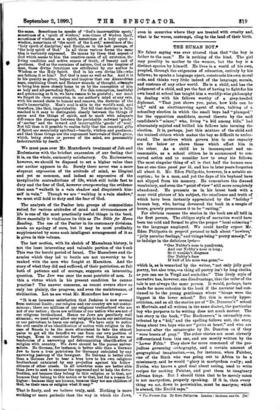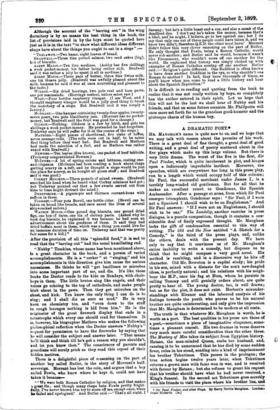THE HUMAN BOY.* No falser saying was ever uttered than
that "the boy is father to the man." He is nothing of the kind. The girl
may possibly be mother to the woman, but the boy is a distinct species by himself. He lives in a world of his own, peopled, through the exigencies of education, entirely by his
fellows; he speaks a language apart, constructs his own moral code, and thinks very little indeed of the language, morals, and customs of any other world. He is a child, and has the judgment of a cbild, and yet the fact of having to fight for his own hand at school has taught him a worldly-wise philosophy in dealing with his fellows worthy of a grey-headed diplomat. "That just shows you, pater, how kids can be led," said an electioneering agent of nine, talking of a schoolboy election in which the small boys had "plumped" for the opposition candidate, moved thereto by the said candidate's "minor," who, living "a kid among kids," had alternately cajoled and bullied his fellows into turning the election. It is, perhaps, just this mixture of the child and the trained citizen which makes the boy so difficult to under- stand, The motives which govern him in one capacity are far below or above those which affect him in the other. As a child he is inconsequent and un- reasonable, as a school citizen he is accustomed to con- certed action and to consider how to sway his fellows.
The most singular thing of all is that half the human race has at one time passé par la, and has in later years forgotten all about it. Mr. Eden Phillpotts, however, is a notable ex- ception; he is a man, and yet the days of his boyhood have not slipped from his memory. He remembers the disused
vocabulary, and even the "point of view" still more completely abandoned. He presents us in his latest book with a most vivid picture of his subject, the excellence and truth of which have been instantly appreciated by the " holiday " human boy, who, having devoured the book in a couple of hours, gravely pronounces it to be "ratting."
For obvious reasons the stories in the book are all told in the first person, The oblique style of narration would have
been too cold and formal to give the proper "local colouring to the language employed. We could hardly expect Mr.
Eden Phillpotts in proprifi persona to talk about howlers,' "jolly peculiar feelings," and things being" pretty measly," or to indulge in the delicious lyric- " Our Nubby's nose is ponderous, And our Nubby's nose is long; So it wouldn't disgrace
Our Nubby's face
If half of his nose was gone,,"— which is, as is remarked by the writer, "not only jolly good poetry, but also true,—a thing all poetry isn't by long chalks,
as you can see in Virgil and such-like." This lively style of narrative has, however, one disadvantage, that the teller of the tale is not always the same person. It would, perhaps, have made for more cohesion in the book if the narrator had con- tinued to be the young gentleman whose "biceps were the biggest in the lower school." But this is merely hyper-
criticism, and as all the stories are of "Dr. Dunston'e" school at Merivale, and all written in the same dialect, the particular boy who purports to be writing does not much matter. The last story in the book, "The Buckeneera," is ostensibly con- tributed by a "kid," and the spelling follows suit, the story being about two boys who are "pints at heart," and who are
lectured after the catastrophe by Dr. Dunston as if they "were beests of pray." The other stories are most cleverly differentiated from this one, and are mostly written by the "Lower Fifth." They show far more command of the pre- judices governing orthography, and a certain amount of geographical imagination,—as, for instance, when Fulcher, one of the Sixth who was going out to Africa to be a missionary, said he would "glory in martyrdom really ; and Nabbs, who knows a good deal about eating, used to write recipes for cooking Falcher, and poet them to imaginary African kings. But I should think that to be merely eaten is not martyrdom, properly speaking. If it is, then every thing we eat, down to periwinkles, must be martyrs; which is absurd, like Euclid says."
* Humcm Boy. By Eden Philipotte. London : Methuen and Co. [Gs.'
Although tie account of the "barring out" in the wing dormitory is by no means the beet thing in the book, the list of provisions laid in by the boys must be quoted here just as it is in the text "to show what different ideas different chaps have about the things you ought to eat in a siege"
" TRICLAWNY.—Two hams, eight loaves of bread. BRADWELL.—Three tins potted salmon, two seed cakes (big), bex of biscuits.
A6LIBT MAJOR.—Ten tins sardines. (Ashby has five shillings a week pocket-money, his father being rather rich. Bradwell maid it was rather a pity he spent it all in sardines.) ASHBY MINOR.—Three pats of butter, three tins Swiss milk, one tin Guava jelly. (Bradwell was awfully pleased about the milk, because he said it was at once nourishing and pleasant to the taste.)
WILSON.—Six dried herrings, two pots veal and barn paste, one pot marmalade. tHerrings useless, unless eaten raw.)
Wasp—Four bottles raspberry vinegar. (I am West, and I thought raspberry vinegar would be a jolly good thing to break the monotony of a siege. But Bradwell said it was simply a luxury.)
MORRANT.—One hamper containing twenty-four apples, twenty- seven pears. two pots blackberry jam. (Morrant has no pocket- money, butlradwell said the fruit was good for a change.) GIDEON.—Nothing. (Gideon is a Jew by birth, and gets ten shillings a week pocket-money. He pretended he had forgotten. Trelawny says he will suffer for it in the course of the siege.) MaTHEas.—Eight pieces of shortbread, five slabs of toffee, seven sausage-rolls. (The rolls were cut in half, to be eaten first thing before they went bad. But Bradwell said Mathers had made the selection of a fool, and so Mathers was rather vexed with Bradwell.) NEWNEB.—Ten loaves (five brown), one packet of beef tabloids. (Trelawny congratulated Newnes.) Mei:ins:8.—A lot of spring onions and lettuces, costing one- and-sixpence. (McInnes had been reading a book about chaps getting scurvy on a raft, and he thought a siege would be just the place for scurvy, so he bought all green stuff ; and Bradwell said it was good.)
CORLEY Mirsixtrs.—Three pounds of mixed sweets. (Bradwell smacked his head when he heard what Corkey minimus had got ; but Trelawny pointed out that a few sweets served out from time to time might distract the mind.) DERBYSHIRE.—A pigeon-pie and thirteen currant-buns with saffron in them.
FORREBT.—Four pots Bovril, one bottle cider. (Bovril can be taken on bread like treacle, and once saved the lives of several shipwrecked sailors.)
WaTsois MINOR.—One pound dog biscuits, one pound dried figs, one box of dates, one tin of shrimp paste. (Asked why he took dog biscuits, he explained it was because he had seen an advertisement about the goodness of them. It said they had dried buffalo meat in them, which was a thing you could live for an immense duration of time on. Trelawny said that was pretty fair sense for a kid.) "
After the provision of all this "splendid food," it is sad to read that the "barring out" had the usual humiliating end.
" Nubby " Tomkine, whose name has been mentioned above, is a great character in the book, and a person of varied accomplishments. He is a " corker " at "singing," and his accomplishments in this direction give him cause for serious uneasiness. He thinks he will "get bacilluses or microbes into some important part of me, and die. It's like those books the Doctor reads to the kids on Sundays, with choir- boys in them. The little brutes sing like angels, and their voices go echoing to the top of cathedrals, and make people blub about in the pews. Then they get microbes on the chest, and kick. You know the only thing I can do is to sing; and I shall die as sure as mud." He is very keen on chemistry too, and "even down to the stuff in cough lozenges nothing is hid from him." He is the originator of the great firework display that ends in a catastrophe which every one should read for themselves. It is, however, his biographer blathers who makes the following philosophical reflection when the Doctor answers " Nubby's " request for permission to have the fireworks by saying that he will consider the subject and answer later. " That means he'll think and think till he's got a reason why you shouldn't, and let you know then." The consciences of parents and guardians will surely prick as they read this expose of their hidden motives.
There is a delightful piece of reasoning on the part of another boy called Butler, in the story of brorrant's half- sovereign. Morrant has lost the coin, and argues that a boy called Fowle, who knew where he kept it, could not have taken it because--
" We were both Roman Catholics by religion, and that makes great tie; and though many chaps hate Fowle pretty fright- fully, I've never known him try to score off me, except once, wheu he failed and apologised. And Butler said That's all rizht, I daresay ; but he's a little beast and a cur, and also a sneak of the deadliest dye. I don't say he's taken the money, because that's a libel, and he might, I believe, go to law against me ; but I do say that only one out of three people could have taken it, and we know two didn't, therefore Q.E.D. the other must have.' Morrant didn't follow this very clever reasoning on the part of Butler. He only thought that Fowle, being a Roman Catholic, would never rob another ; and Butler said he would, because it wasn't like Freemasons, who wouldn't score off one another for the world. He explained that history was simply choked up with examples of Roman Catholics scoring off one another. Butler said Religion's quite different. One Buddhist is often known to have done another Buddhist in the eye, so why shouldn't one Roman do another ? In fact, they have thousands of times, as you'll know when you come to read a little history and hear about the Spanish Inquisition.'" It is difficult in re-reading and quoting from the book to realise that it was not really written by boys, so completely has the author entered in their spirit. Let us hope that this will not be the last we shall hear of Nubby and his friends, and that on some future occasion Mr. Phillpotts will once more set forth for us the graceless good-humour and the grotesque charm of the human boy.



































 Previous page
Previous page